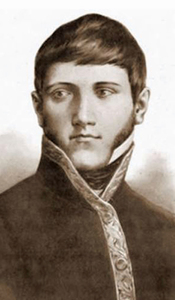Having received the final orders from the Comandante, a wide-ranging passport from the Governor, and the kind letters of introduction from the Very Reverend Provincial Fathers of San Agustín and Santo Domingo, whose friars administer the provinces that I was to pass through, I departed from Manila River at seven o’clock in the morning of 18 April, accompanied by Segundo Piloto Don Gerónimo Delgado and Seaman Gerónimo Arcangel. I carried with me pocket chronometer number 351 by Arnold, which had been rated in Manila, theodolite number 3, a sextant made by Nairne, a marine compass and a log-line. Our route was to take us directly to Arayat, crossing the bay to the mouth of the Betis River.
Accordingly, we followed the coast along the NE part of the bay in a panga, and, after a run of eight leagues, we reached the bar at the entrance [to the river]. Once we had crossed the bar we continued between the leafy banks of the Betis River, with groups of huts here and there, used for cutting firewood and nipa palms. The lower reaches of the river trend north to NNW for about the first five miles, then continue in the direction of the first and fourth quadrants as far as the town of Guagua, which is well placed on the river bank at a distance of about four leagues from the bar.
After making all the necessary arrangements in this town for the safe transport of the instruments, we set out the following day on our journey by land, passing through the province of Pampanga to Lingayen, the principal town of the province of Pangasinan. The road is extremely agreeable, both because of the delightful luxuriance of the vegetation throughout and also because of the hospitality, as obliging as it is unobtrusive, and the most active assistance to be found at every step.
The alcalde mayor of the province of Pampanga, Don Pablo Biron, who lives in the principal town, Bacolor, moved by a sincere desire to serve His Majesty to the best of his ability, sent instructions round the entire district for us to be given all the help we might need. The Reverend Fathers of Santo Domingo and San Agustín carried out this order with benevolent zeal as well as lodging us most kindly in their monasteries and showing, by their active measures, the extent of their influence over the natives, undoubtedly won by gentleness, love and kindness, all these being virtues that I have observed to be most characteristic of the members of both orders. The nature of the native priests is not comparable since, sharing the customs of the Indians, they are as the mass of the people. It is clear, at first glance, that they have little influence, not only in being unable to uphold the dignity of their office, but also because of their inactivity which prevents them from putting any idea into effect, however limited it may be. I became increasingly fixed in this opinion when I noticed the difference between the towns administered by the Spanish missionaries and those under the native Filipino parish priests. The former, one can often see, are orderly, their towns are well situated and kept clean, the people are hard working, public schools are well attended and natives well dressed, while in the latter one sees widespread idleness, indolence, neglect and laxity, evils which cannot be corrected until the parishes are returned to more industrious hands, whose efficacy is already thoroughly proven and whose principles are well known in these islands.
Don Alejandro Malaspina’s instructions included the acquisition of political information as well as the exercise of our professional skills, although preference was always to be given to the latter. In view of this and the fact that the season was fairly advanced, to carry out the former instruction would require me to spend longer in the towns and thus misuse our very limited time. It therefore seemed to me more prudent to suggest that the alcaldes mayores give prompt and carefully considered answers to various questions which I left in writing with the alcalde mayor of Pampanga for that purpose, intending to check them against those of the alcaldes mayores of the other provinces, whom I likewise implored to have their answers ready for my return at the end of May.
